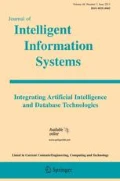Abstract
The core of the Internet and World Wide Web revolution comes from their capacity to efficiently share the huge quantity of data, but the rapid and chaotic growth of the Net has extremely complicated the task of sharing or mining useful information. Each inference process, from Internet information, requires an adequate characterization of the Web pages. The textual part of a page is one of the most important aspects that should be considered to appropriately perform a page characterization. The textual characterization should be made through the extraction of an appropriate set of relevant concepts that properly represent the text included in the Web page. This paper presents a method to obtain such a set of relevant concepts from a Web page, essentially based on a relevance estimation of each word in the text of a Web page. The word-relevance is defined by a combination of criteria that take into account characteristics of the HTML language as well as more classical measures such as the frequency and the position of a word in a document. Besides, heuristic rules to obtain the most suitable fusion of criteria is achieved via a statistical study. Several experiments are conducted to test the performance of the proposed concept extraction method compared to other approaches including a commercial tool. The results obtained here exhibit a greater success in the concept extraction by the proposed technique against other tested methods.
Similar content being viewed by others
References
Baeza-Yates, R. and Ribeiro-Neto, B. (1999). Modern Information Retrieval. Addison-Wesley: ACM Press Books.
Chen, H. and Dumais, S.T. (2000). Bringing Order to the Web: Automatically Categorizing Search Results. In Proc. Of CHI'00, Human Factor in Computing Systems (pp. 145-152). Den Haag, New York, US: ACM Press.
Dunham, M.H. (2002). Data Mining. Introductory and Advanced Topics. Upper Saddle River, NJ: Prentice Hall.
Fresno, V. and Ribeiro, A. (2001). Feature Selection and Dimensionality Reduction inWeb Pages Representation. In International ICSC Congress on Computational Intelligence: Methods & Applications (pp. 416-421). Bangor, Wales, U.K.
Gales, W., Kenneth, W.C., and Yarowsky, D. (1992). A Method for Disambiguating Word Senses in a Large Corpus. Computers and the Humanities, 26, 415-439.
Gudivada, V.N., Raghavan, V.V., Grosky, W.I., and Kasanagottu, R. (1997). Information Retrieval on the World Wide Web, IEEE Internet Computing. Sept.-Oct., 58-68.
Henzinger, M. (2000). Link Analysis in Web Information Retrieval. Bulletin of the Technical Committee on Data Engineering, 23, 3-8.
Hovy, E. and Lin, C.Y. (1999). Automated Text Summarization in SUMMARIST. In I. Mani and M.T. Maybury (Eds.), Advances in Automatic Text Summarization. Cambridge, MA. The MIT Press.
Koller, D. and Sahami, M. (1996). Toward Optimal Feature Selection. In ICML-96: Proceedings of the Thirteenth International Conference on Machine Learning (pp. 284-292). San Francisco, CA: Morgan Kaufmann.
Kosala, R. and Blockeel, H. (2000). Web Mining Research: A Survey. ACM SIGKDD Explorations, 2(1), 1-15.
Manning, C.D. and Schtze, H. (2001). Foundations of Statistical Natural Language Processing, Cambridge, MA: The MIT Press.
Mitchell, T.M. (1997). Machine Learning. McGraw-Hill International Editions.
Mladenic, D. (1999). Text-Learning and Related Intelligent Agents. IEEE Expert Special issue on Applications of Intelligent Information Retrieval. July-August.
Musciano, C. and Kennedy, B. (1997). HTML The Complete Guide. McGraw Hill.
Salton, G., Wong, A., and Yang, C.S. (1975). A Vector Space Model for Information Retrieval. Communications of the ACM 18(11), 613-620.
UNCTAD(2002). E-Commerce and Development Report 2002. Report of the United Nations Conference on Trade and Development. United Nations, New York and Geneva.
Yang, Y., Slattery, S., and Ghani, R. (2002). A Study of Approaches to Hypertext Categorization. Journal of Intelligent Information Systems, 18(2), 219-241.
Author information
Authors and Affiliations
Rights and permissions
About this article
Cite this article
Fresno, V., Ribeiro, A. An Analytical Approach to Concept Extraction in HTML Environments. Journal of Intelligent Information Systems 22, 215–235 (2004). https://doi.org/10.1023/B:JIIS.0000019277.82436.17
Issue Date:
DOI: https://doi.org/10.1023/B:JIIS.0000019277.82436.17




